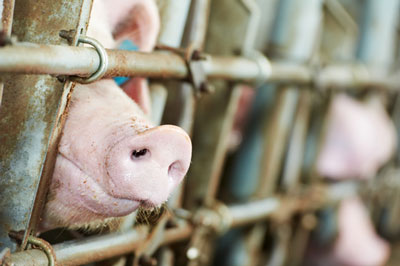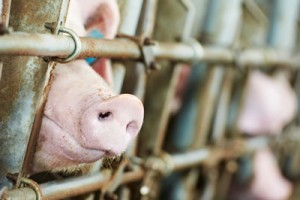Superbug livestock-associated MRSA CC398 found in British pork
- Like
- Digg
- Del
- Tumblr
- VKontakte
- Buffer
- Love This
- Odnoklassniki
- Meneame
- Blogger
- Amazon
- Yahoo Mail
- Gmail
- AOL
- Newsvine
- HackerNews
- Evernote
- MySpace
- Mail.ru
- Viadeo
- Line
- Comments
- Yummly
- SMS
- Viber
- Telegram
- Subscribe
- Skype
- Facebook Messenger
- Kakao
- LiveJournal
- Yammer
- Edgar
- Fintel
- Mix
- Instapaper
- Copy Link
Posted: 18 June 2015 | Victoria White | No comments yet
The findings of a new study into retail meat have revealed livestock-associated MRSA CC398 (LA-MRSA CC398) in British pork…


A survey carried out earlier this year has found the first evidence of the ‘superbug’ bacteria Methicillin-Resistant Staphylococcus aureus (MRSA) in sausages and minced pork obtained from supermarkets in the UK.


In February, a team of researchers funded primarily by the Medical Research Council (MRC) bought and analysed a total of 103 (52 pork and 51 chicken) pre-packaged fresh meat products, labelled as being of UK farm origin, from supermarkets in five different locations across England.
The researchers analysed the genetic make-up of the bacteria and confirmed the presence of antibiotic resistant genes. The analysis showed that the bacteria belonged to a type of MRSA known as LA-MRSA CC398, which has emerged over the last few years in continental Europe, particularly in pigs and poultry, but was not previously believed to be widely distributed in the UK.
Emergence of LA-MRSA CC398 linked to intensive farms
The emergence of LA-MRSA CC398 is linked to intensive farms – overcrowding on intensive farms can lead to disease so farmers may become reliant on antibiotics to keep animals healthy. Overuse of antibiotics encourages the emergence of drug-resistant bacteria like LA-MRSA CC398.
Antibiotic resistance is predicted to cause one million deaths across Europe by 2025. This discovery is the latest warning that overuse of antibiotics on farms is posing a risk to human health. While efforts are being made to reduce antibiotics in human medicine, there’s less focus on the huge volumes used on our farms.
Other European countries have already witnessed the spread of LA-MRSA CC398 through pig herds, and many have now introduced direct testing of pigs. Similar testing has not yet been introduced to the UK.
LA-MRSA CC398 can be transmitted by touching infected meat products or coming into contact with contaminated livestock or people. Many people carry LA-MRSA CC398 without any signs of illness, but some have developed skin complaints, and the bug can cause life-threatening infections, including pneumonia and blood poisoning.
Adequate cooking and hygienic precautions should minimise the likelihood of transmission of LA-MRSA CC398
The researchers stress that adequate cooking (heating above 71°C) and hygienic precautions during food preparation should minimise the likelihood of transmission to humans via contaminated pork. However, they argue that the discovery of LA-MRSA CC398 in pork identifies a potential way that the bacteria can spread from farms to the wider population.
While human contamination of carcasses or meat products in the abattoir or at the meat packing plant may occur, there is good evidence that these isolates are of animal origin – possibly through the use of antibiotics to treat or control infection in livestock.
As the tests use a highly sensitive method of detection of bacterial contamination, the numbers of MRSA bacteria present may be low. The researchers say that as the two infected samples contained processed pork (sausages and minced pork), they cannot rule out that the meat packing plants from which the MRSA from this study originated also handle imported meat. If this were the case, it is conceivable that cross-contamination might have occurred between non-UK to UK sourced meat.
First time that LA-MRSA CC398 has been detected in UK retail meat products
Dr Mark Holmes from the Department of Veterinary Medicine at the University of Cambridge says, “This is the first time that MRSA has been detected in retail meat products in the UK. The public should not be overly worried by this as sensible food precautions and good hygiene should prevent its spread. It’s also usually pretty harmless and only causes health problems if it infects someone in poor health or gets into a wound.
“However, this does suggest that MRSA is established in our pig farms and provides a possible route of transmission from livestock, through those in direct contact with pigs, into the wider population.”
Dr Des Walsh, Head of Infections and Immunity at the MRC, added, “Studies like this are crucial not just to reveal concerns to human health through contaminated livestock, but to show resistance to antibiotics is a problem growing far beyond just humans. To win the fight against antimicrobial resistance, we need an all hands on deck approach, and that’s why we’ve teamed up with leading experts in biological, social and others sciences in a joint initiative designed to find new solutions, fast.”
The research was funded by the Medical Research Council, with additional support from the Alliance to Save our Antibiotics. The results of the study are published in the journal Eurosurveillance.




